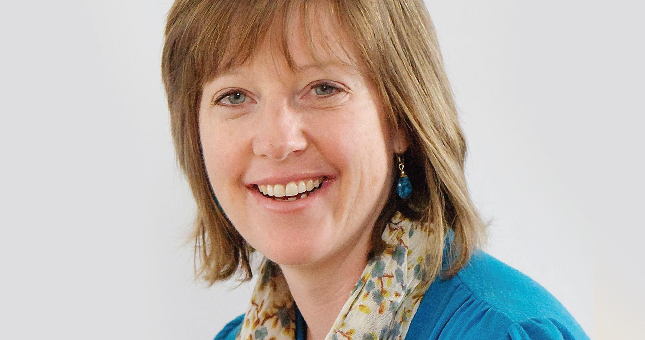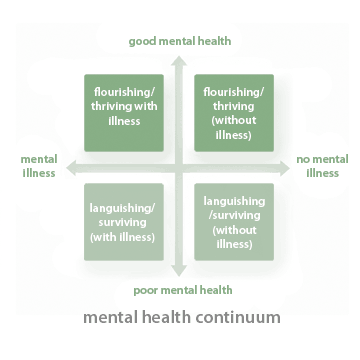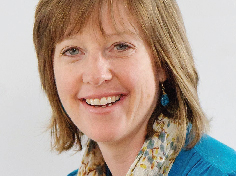
Companions on the Journey
Sharon Smith & Sanctuary Mental Health Ministries
“In the church—and in the Christian community in general—there is a fear of journeying with people who are suffering with a mental health issue,” observes Sharon Smith. “We’ve medicalized mental health to the point that we’ve forgotten how to simply be companions.”
This is one of the key reasons why, in 2011, Sharon started Sanctuary Mental Health Ministries as a not-for-profit, charitable organization committed to journeying with churches and parishes, preparing them to support mental health recovery within their community.
The idea for Sanctuary emerged out of a study that Sharon and Sanctuary co-founder Caroline Penhale conducted for Vancouver Coastal Health on how spirituality functions during mental health crises and recovery. “We surveyed people of all faith backgrounds who were using mental health services in the community,” explains Sharon. “The one common theme that emerged is that spiritual communities generally do not talk about mental illness and that the people struggling with these issues don’t feel accepted.” This study helped Sharon and Caroline recognize a need within the Christian church to equip pastors and entire church communities on how to care for people with mental health challenges.
The name “Sanctuary” was suggested to Sharon and Caroline by someone who lives with bipolar disorder. The name is particularly apt, not just because it connotes the idea of a safe place, but also because it’s a term that has a particular historical meaning in the development of the mental health profession. “In the Middle Ages,” recounts Sharon, “in the witch hunt era, people with mental health issues were considered possessed by evil and were hunted down. Churches provided sanctuary—in a physical sense by supplying food and shelter, and eventually in a medical sense, as doctors began to care for these individuals and study their conditions. This was actually the birth of psychiatry as a profession.”
Ironically, in order to become more widely recognized as a legitimate profession, psychiatry distanced itself from the church over time, and there now exists a type of schism between the two. “We need to bring psychiatry back into conversation with spirituality and theology,” insists Sharon.
Part of this disconnect has resulted in “false theologies” that have become a stumbling block for certain churches. “In justice-oriented church traditions,” observes Sharon, “we’ve relegated mental health issues to marginalized communities only—the homeless, the addicted—creating an ‘us/them’ model. There’s this belief that Christians are somehow immune to that kind of suffering.” But if you look at the statistics on Sanctuary’s website, 1 in 5 Canadians will experience a mental health issue in any given year, while 1 in 3 Canadians will experience a mental health issue in a lifetime (based on a 2011 Mental Health Commission of Canada study). These are staggering numbers.
Another theological misconception prevalent in many churches, says Sharon, is a “lack of acknowledgement of the self.” When someone’s behaviour deviates from “how a Christian ought to act,” she observes, “we’re very quick to judge the action and call it a sin, but we’re not very good at teaching compassion to the self. We emphasize confession, forgiveness, and taking responsibility for one’s actions, and all of those are incredibly important, but we also need to pay attention to what’s going on inside an individual.” Our behaviour, she insists, is driven by so many complex factors: biology (including brain chemistry), learned behaviour, sins committed against us, past traumas, needs that have gone unmet. Taking all of this complexity into account, believes Sharon, is vital to understanding how to care for people whose mental health is not thriving as it could be.
“Our core value at Sanctuary,” explains Sharon, “is honouring lived experiences. We want to pay attention to what happens in our lives as Christians.” This paying attention is particularly important in contemporary Western culture, where mental illness is on the rise. Anxiety, especially in children and youth, is one of the most common mental health issues of our time. The reasons, explains Sharon, are multiple and complex: “the fast pace of our lifestyles, technology, the breakdown of the family, high self-expectations, high expectations from others. Our identities, which used to be rooted in our spiritual communities, are now shaped by consumeristic values. There is a pressure to perform and to be adequately rewarded for our performance. Our current lifestyle challenges what it means to be human. We’re expecting more than we can do.”
Mild to moderate depression are also becoming more widespread. While severe depression lasts at least three to six months and requires chemical help, mild to moderate depression generally do not require medication, but a treatment focused on learning specific coping skills, making changes to diet and exercise, and being part of a supportive and caring community.
Sanctuary has adopted the community mental health model developed by Dr. Corey Keyes, an American sociologist and psychologist. “We believe that mental health is an issue for everybody,” continues Sharon. “And when I say mental health, I literally mean mental wellbeing. Many people use the term ‘mental health’ to actually mean ‘mental illness.’”

Dr. Keyes has developed a model of mental wellness called the Mental Health Continuum. This model is based on two criss-crossing lines: mental health and mental illness. “The important thing about this model,” clarifies Sharon, “is to acknowledge that all people will move up or down the mental health spectrum throughout their lives, but only some people will have a clinical mental illness. At the same time, it’s entirely possible for individuals with a clinical mental illness to be in generally good mental health, although they have to work much, much harder to get there.”
In fact, Sharon insists that while she has no diagnosed mental illness herself, she has learned a great deal from people who do struggle with mental illness. “We've absorbed the secular vision proposed by Western culture that we should live primarily to be happy,” says Sharon. “But loneliness needs to be talked about. Suffering needs to be talked about. Those extreme and painful experiences are our greatest teachers. And in Christianity, we already have such beautiful language to talk about suffering. We’ve really undervalued the church in all of this.”
Sharon is currently working with the Catholic Archdiocese of Vancouver, and will be offering a series of workshops to the Deaneries of New Westminster. “What I want to emphasize to the priests is this: your parishes are places of healing. And you already have so many beautiful and wonderful tools: the rhythms of the liturgical year, the structure of the week, the practice of Sabbath, the Eucharist.”
Ultimately, concludes Sharon, Christianity is about “holding that tension between suffering and joy in the Lord.” And some cultures are better at doing that than others. Sharon touches on her experience of growing up in Johannesburg, South Africa. “Southern African cultures are much more open about this stuff. Just think of their music: there is often an expression of intense joy alongside deep pain.” Assisting faith communities to create a space for that tension to emerge, be supported, and be openly talked about is what Sanctuary Mental Health Ministries is all about.
If you or your parish/church leader would like to connect with Sanctuary, email [email protected]. They would be delighted to have a conversation with you.
Sharon Smith co-founded Sanctuary Mental Health Ministries in 2011 and currently serves as Sanctuary's Founding Director. Sharon has spent much of her professional career working as an occupational therapist in acute and community mental health settings in South Africa and Vancouver. She has a Master of Theological Studies from Regent College (2004) and a PhD in Rehabilitation Sciences from the University of British Columbia. Her dissertation explored the meaning of spirituality for people living with schizophrenia. She is passionate about working with people who experience mental health issues, facilitating their integration into spiritual communities. Mental health work became a personal passion for Sharon when she journeyed with her late husband, Alex, through his depression, which resulted in his suicide in 2005. Sharon consults for mental health organizations, helping mental health professionals integrate spirituality into mental health care. Her most recent work has been with Vancouver Coastal Health. Sharon is clinical faculty in the Department of Occupational Science and Occupational Therapy at the University of British Columbia, and a frequent guest lecturer at Regent College.




